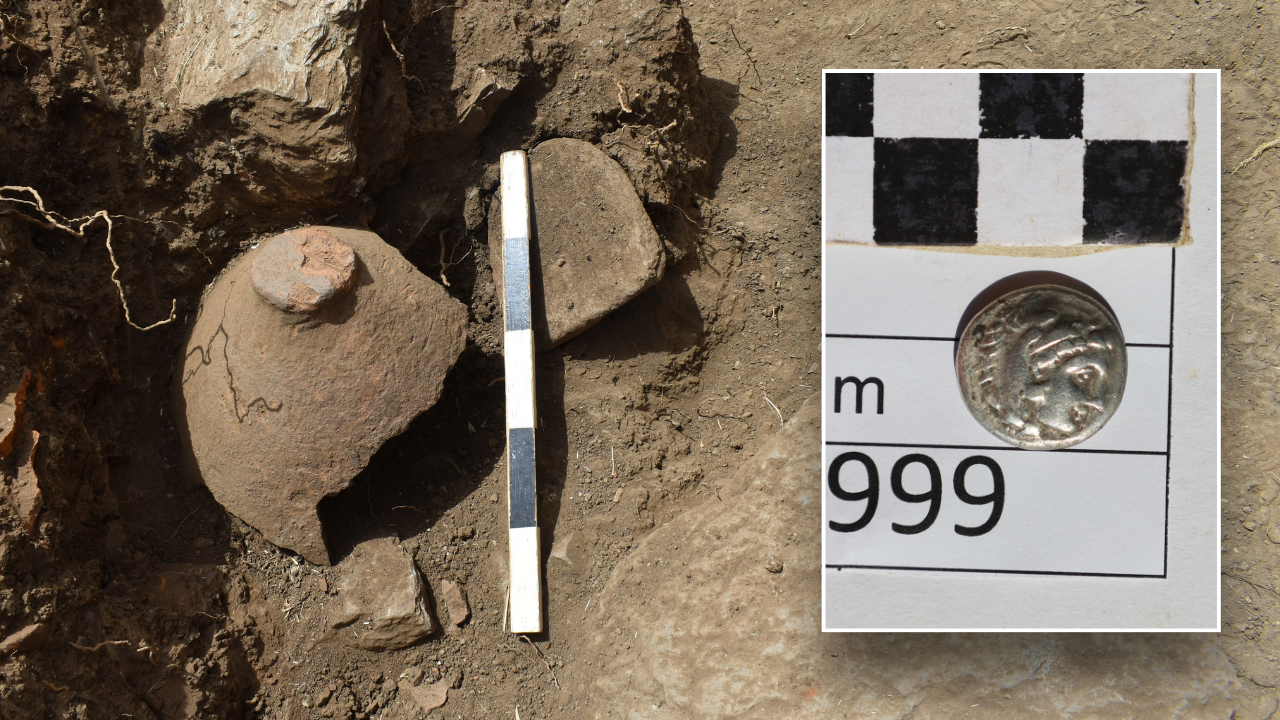Archaeologists recently uncovered the remains of a lost city dating back thousands of years – and newfound evidence suggests it may be the capital of a once-thriving civilization.The recent excavation was announced by California State Polytechnic University, Humboldt, on April 4. It took place at Gradishte, an archaeological site near the North Macedonian village of Crnobuki; it was done with the help of experts from Macedonia’s Institute and Museum in Bitola.Speaking to Fox News Digital, Nick Angeloff, an anthropology professor and archaeologist with Cal Poly Humboldt, said it appears likely the site is Lyncus, the lost capital of the Kingdom of Lyncestis. The kingdom was conquered by King Philip II of Macedon in 358 B.C.SECRET ‘SISTINE CHAPEL’ DECKED OUT WITH FRESCOES IN UNLIKELY LOCATION”Every indication is pointing toward this being the city of Lyncus, within Lyncestis,” Angeloff said. “Nothing is pointing away from it being Lyncus.”Lyncus was the only city associated with Upper Macedonia, according to Angeloff, and had never been found before.”[The discovery is] very rare,” the expert said. “It’s a unique find.”Lyncus, settled in the 7th century B.C., was the birthplace of Eurydice I of Macedon. DOZENS OF ANCIENT SKELETONS FOUND IN HEART OF BUSTLING CITY: ‘HARD TO IMAGINE’Though few have heard of the ancient queen, nearly everyone has heard of her grandson, Alexander the Great.”This is the only appropriate location that we have determined may be the ancient city of Lyncus, where Alexander the Great’s grandmother was born and raised,” he said.”Eurydice I was a very powerful woman in that time in human history,” the archaeologist continued.”There’s only one city that she could have come from, and we may have found it.”She also said, “Without Eurydice, we don’t have Philip II, Alexander’s father, nor do we have Alexander the Great.”EXPERTS SHOCKED BY ANCIENT KING ARTHUR MANUSCRIPT FOUND TUCKED INSIDE BOOK: ‘SURVIVED THE CENTURIES’Information about the site is rapidly changing. Initially, historians believed the ruins at Gradishte were built during the reign of Macedonian leader King Philip V, who ruled from 221 to 179 B.C.But a coin from Alexander the Great’s reign emerged, pushing it back to the 4th century B.C. Now, it looks like the site was also occupied hundreds of years before, during the Bronze Age.At the site, archaeologists used the remote-sensing technology LiDAR (Light Detection and Ranging) to see beneath the ground. Angeloff estimated that roughly 10,000 people lived in the city at its peak, though future excavations are likely to yield more accurate information.”It has become very clear, using technology, that the fortress [we found] was designed to hold an entire city,” the historian said. “And we see the whole array of infrastructure required to hold a city inside fortress walls during an attack by Rome in particular in this case.”CLICK HERE TO SIGN UP FOR OUR LIFESTYLE NEWSLETTERAngeloff added, “We were able to overlay and see what was underneath the ground. And the acropolis that it sits on, which is basically a flat hilltop, has enough rooms and infrastructure to hold an entire city inside the fortress walls.”Excavators discovered a textile workshop in addition to numerous artifacts, including a coin with Alexander the Great’s likeness, axes, game pieces, an oil lamp, even a small ceramic displaying a heart motif.One of the most curious artifacts was a clay theater ticket, which Angeloff said was unique to North Macedonia.”Typically, theater tickets [were] made of a metal, whether bronze or iron, but they’re always reused,” he said. “There has never been a location in North Macedonia with a theater ticket that has been found that did not have a theater.”For more Lifestyle articles, visit foxnews.com/lifestyleHe added, “Using our LiDAR, we think we may have located the theater, and it looks, for all intents and purposes, like a Macedonian theater, not a Roman theater.”The archaeologist, stressing the historical importance of the project, said his team plans to return to North Macedonia in May and June for more excavations.”The potential for archaeology across North Macedonia to inform our understanding of the classical [eras], as well as the Roman era, is highly significant,” Angeloff said. “There’s been relatively little work and relatively little investment into this region.””So we have an opportunity here to expand our knowledge of the times of Alexander the Great, [and] the times of the Roman Empire, exponentially, through our work in Macedonia.”Fox News Digital’s Kyle Schmidbauer contributed to this report.







